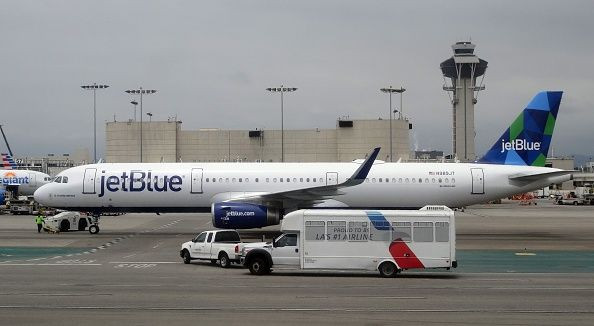JetBlue Is Tiptoeing Back Into The Cargo Business

A little less than four years ago, JetBlue Airways (NASDAQ:JBLU) surprised investors by shutting down its cargo business. At the time, the company said that its cargo operation wasn't making much money and didn't fit into its future strategy.
However, JetBlue is now reversing course -- or at least considering it. On Monday, the airline announced that it will partner with Aeronex Cargo to resume cargo service on certain routes in the years ahead.
A gradual return to the cargo market
Aeronex Cargo will do most of the behind-the-scenes work necessary to make JetBlue's new cargo service work. This will limit the carrier's need to invest money and crew-member time in building up a cargo operation.
JetBlue will start by offering cargo service in Fort Lauderdale. Initially, Aeronex will arrange for cargo originating in Fort Lauderdale or arriving there on other passenger and freight airlines to be sent on JetBlue flights to selected destinations in the airline's route network. Later on, Aeronex will begin transferring cargo from Miami International Airport -- an airport with far more cargo traffic -- to Fort Lauderdale for onward transport by JetBlue.
By the end of 2019, JetBlue will launch cargo service in partnership with Aeronex at three more key bases: Boston, Los Angeles, and New York's JFK Airport. Within five years, JetBlue hopes to offer cargo service between 30 of the more than 100 airports in its route network.
Why cargo might again make sense for JetBlue
JetBlue's about-face on cargo might seem odd but can probably be traced to changes in the airline's fleet. Back in late 2015, when the company decided to shut down its cargo operation, management noted that JetBlue had limited cargo capacity due to the nature of the aircraft it operated. At the time, its fleet consisted of 130 Airbus(OTC:EADSY) A320s, 21 A321s, and 60 Embraer E190s.
The E190s are 100-seat planes with little or no room for cargo. Meanwhile, JetBlue's workhorse Airbus A320s have limited space for cargo after accounting for passenger bags. JetBlue's project to add 12 extra seats to each A320will make that worse -- a factor that contributed to the 2015 decision to exit the cargo market. Additionally, on longer flights (such as transcontinental routes), the A320 is often unable to carry cargo due to weight limits.
However, by the end of 2018, JetBlue had tripled the size of its Airbus A321 fleet to 63 aircraft. The A321 has room for 10 LD3 containers -- compared to seven for the A320 -- and has a maximum takeoff weight of 93.5 metric tons, 20% higher than the A320's 78 metric tons. As JetBlue's A321 fleet has grown, its cargo-carrying potential has increased, too.
JetBlue expects to add 85 Airbus A321neos to its fleet between 2019 and 2024 (including 26 longer-range variants). This will give it even more capacity to carry cargo than it can today. The planned replacement of JetBlue's E190swith the larger Airbus A220 over the next six years may also provide some incremental cargo capacity.
There's no guarantee of success
The gradual shift in JetBlue's fleet from the Airbus A320 to the larger A321 and A321neo models is making the cargo market more attractive for the carrier. Additionally, working with Aeronex may address the other main reason for JetBlue's earlier decision to exit the cargo business -- the need to make significant investments to drive growth in cargo.
That said, while the Aeronex partnership may be a low-risk way to resume cargo operations, it's not guaranteed to succeed. Indeed, less than a year ago, JetBlue partnered with FlyKargo to carry cargo between Fort Lauderdale and San Juan, with the possibility of expanding to additional routes in the future. However, JetBlue appears to have ended that arrangement after the three-month trial period.
Cargo is never going to be a major revenue driver for JetBlue as long as the airline continues to operate an all-narrow-body fleet. If partnering with Aeronex will allow it to generate some extra revenue without adding much incremental cost or complexity, that would be great for investors. But if it becomes a distraction to management and front-line employees, then JetBlue may find that it's better to stick to its core business of carrying passengers.
Adam Levine-Weinberg owns shares of Embraer and JetBlue Airways. The Motley Fool recommends JetBlue Airways. The Motley Fool has a disclosure policy.
This article originally appeared in The Motley Fool.




















